Charles E W Bean, Diaries, AWM38 3DRL 606/237/1 - October 1914 - 1918 - Part 8
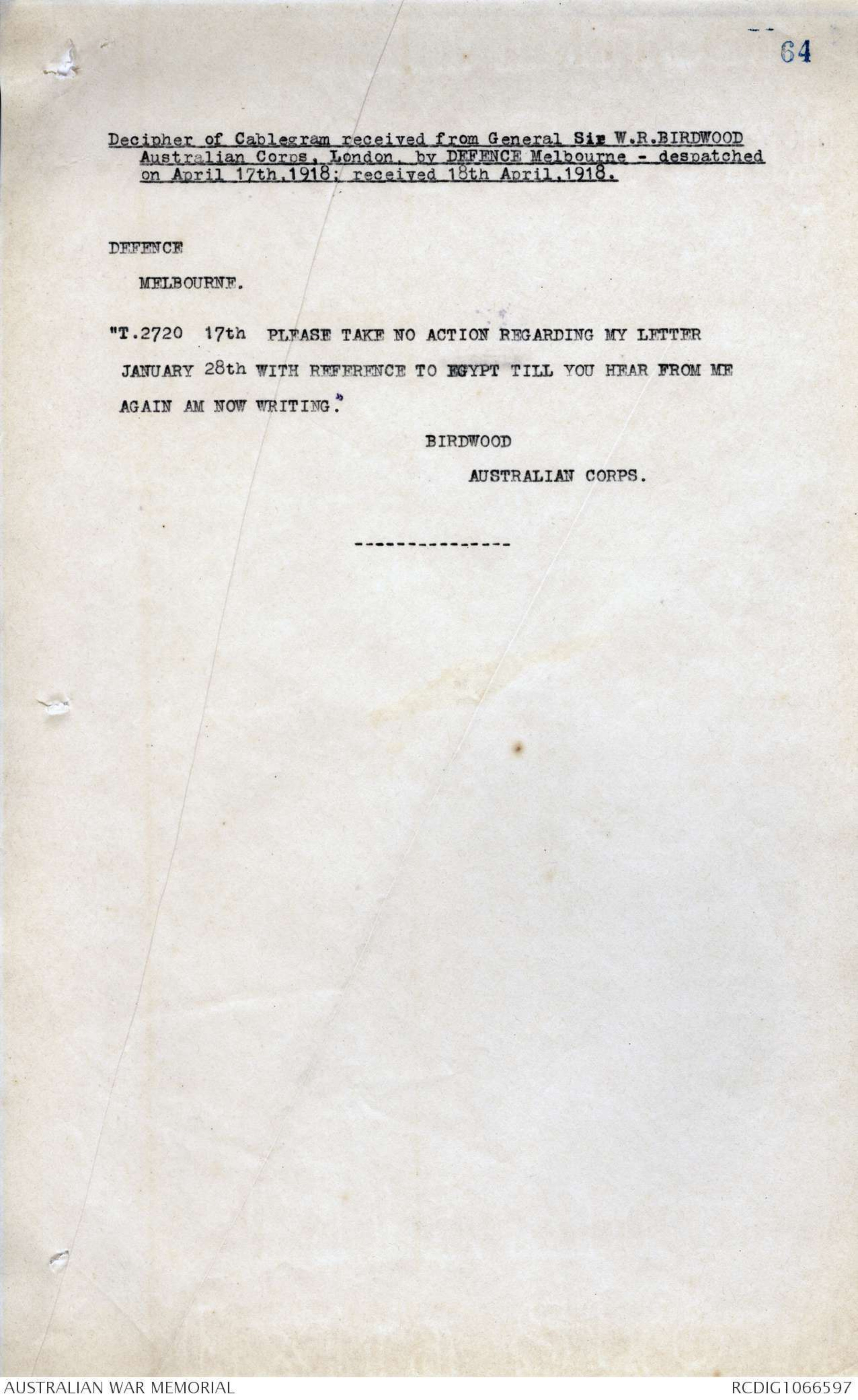
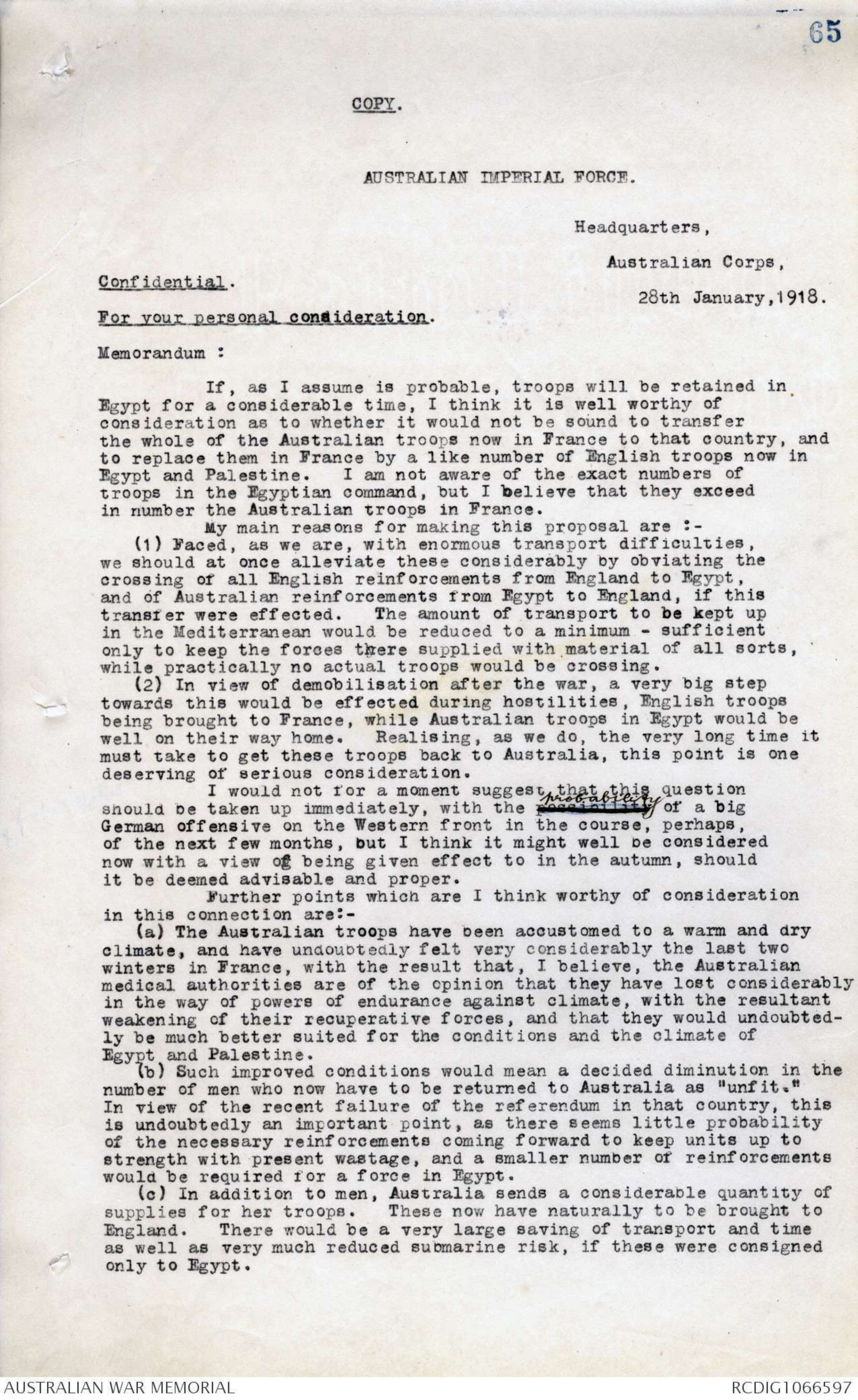
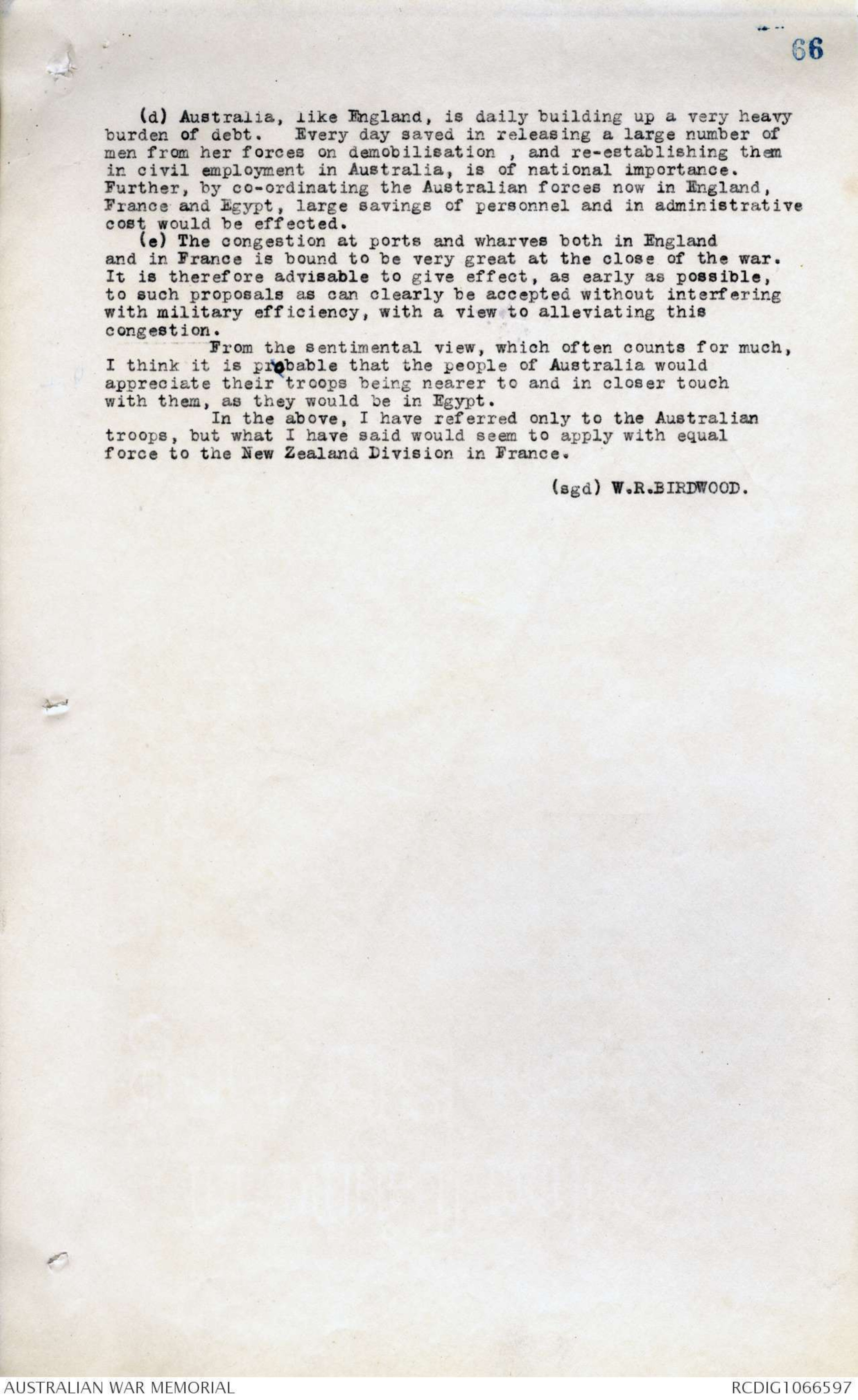
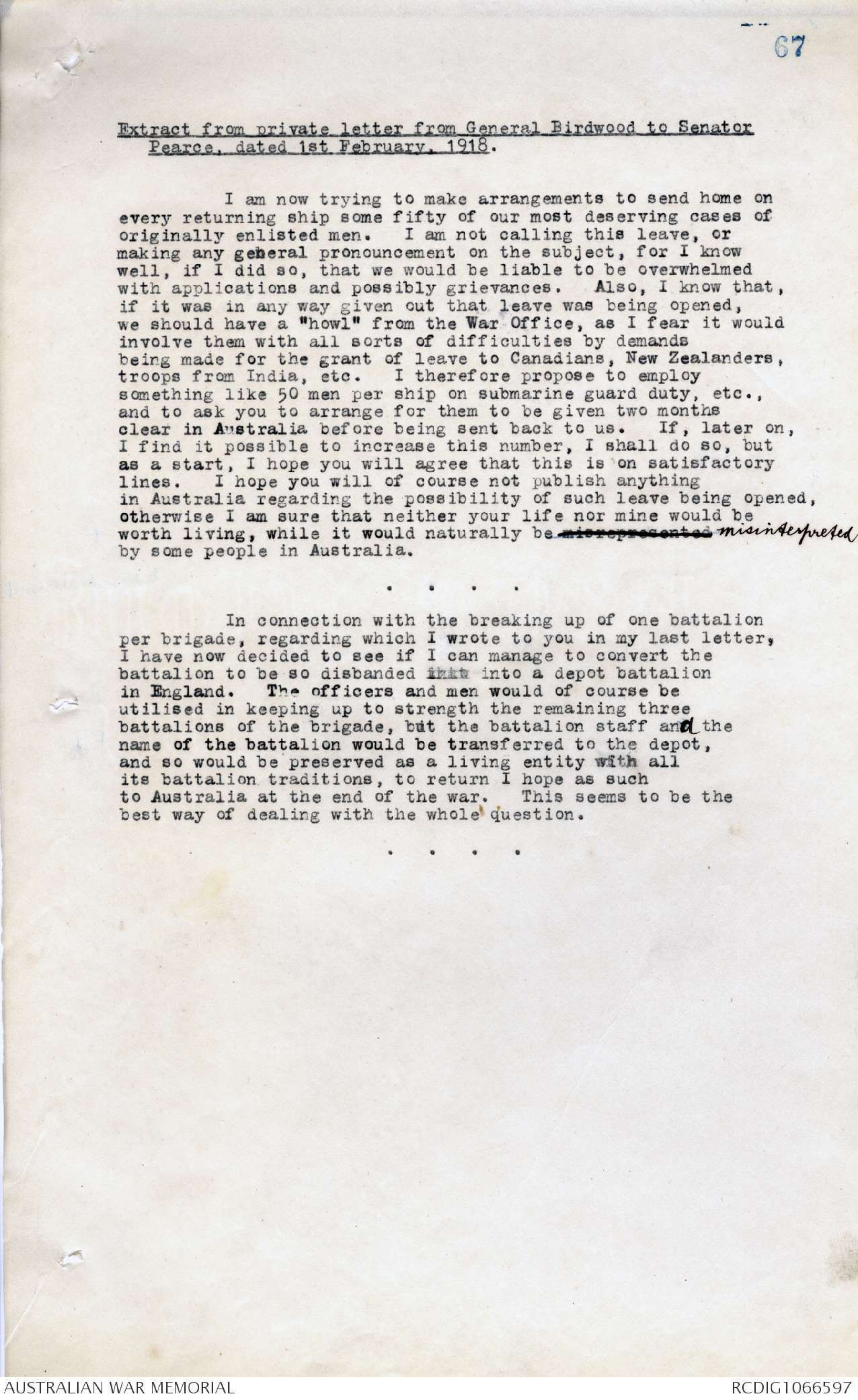
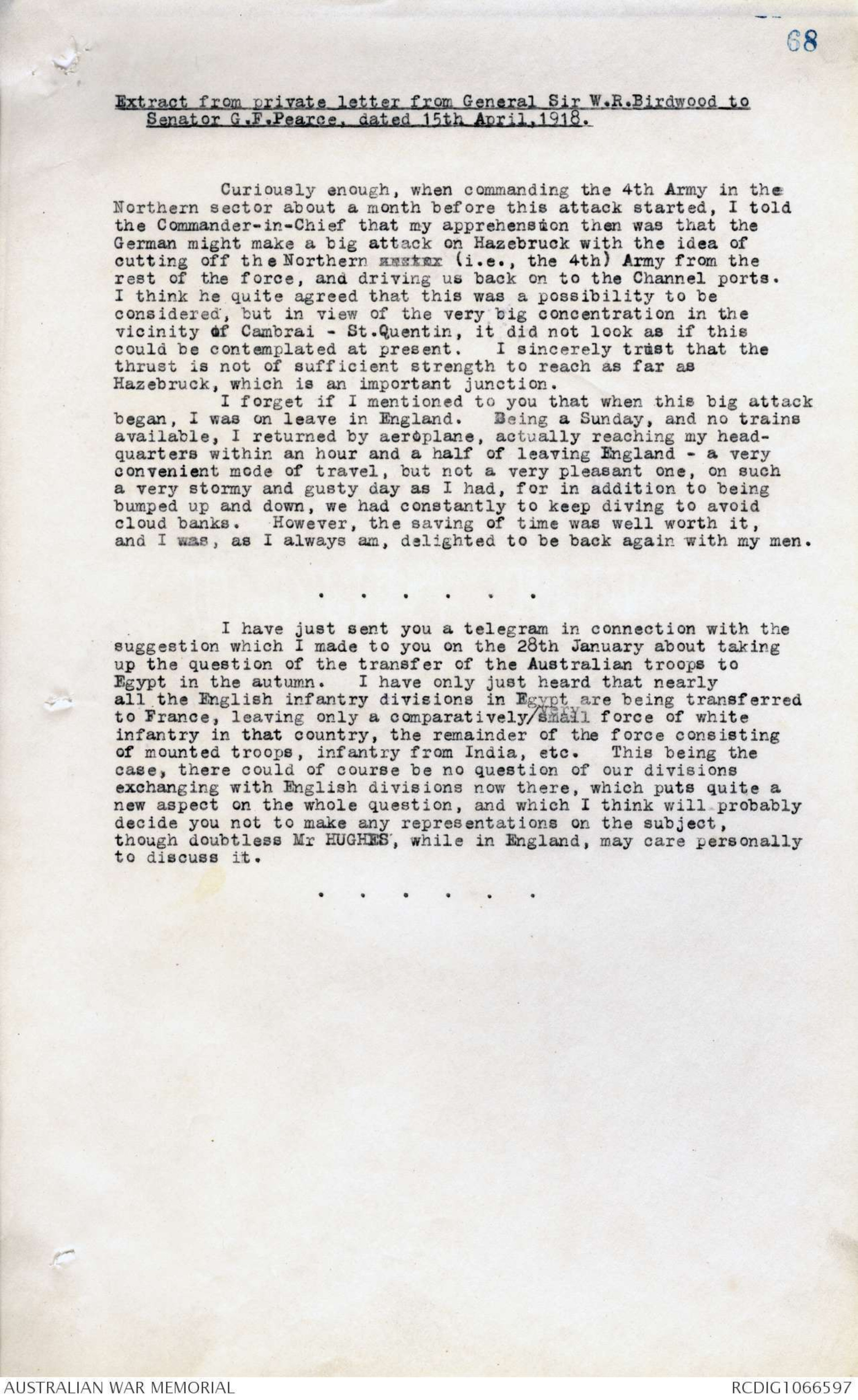
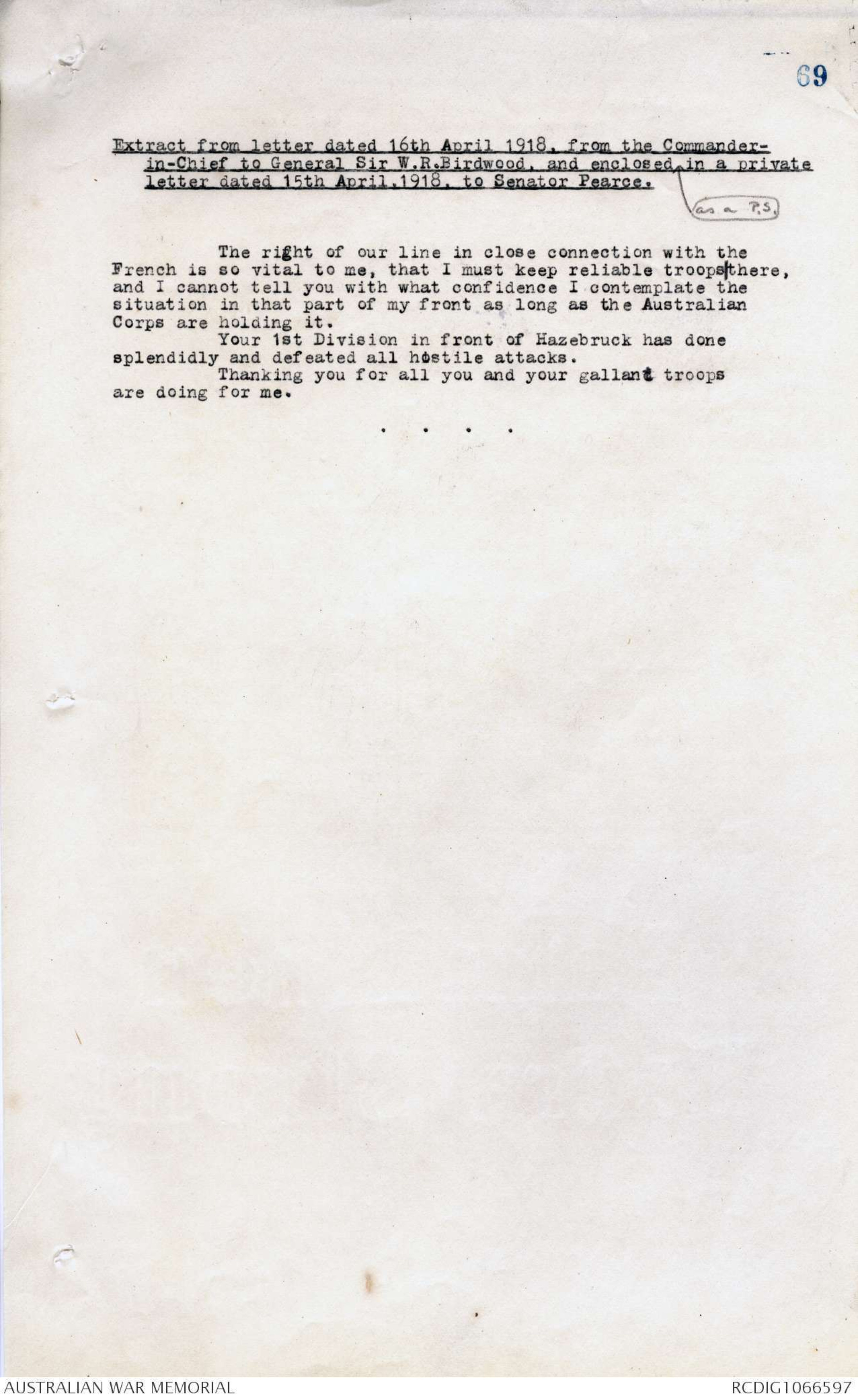
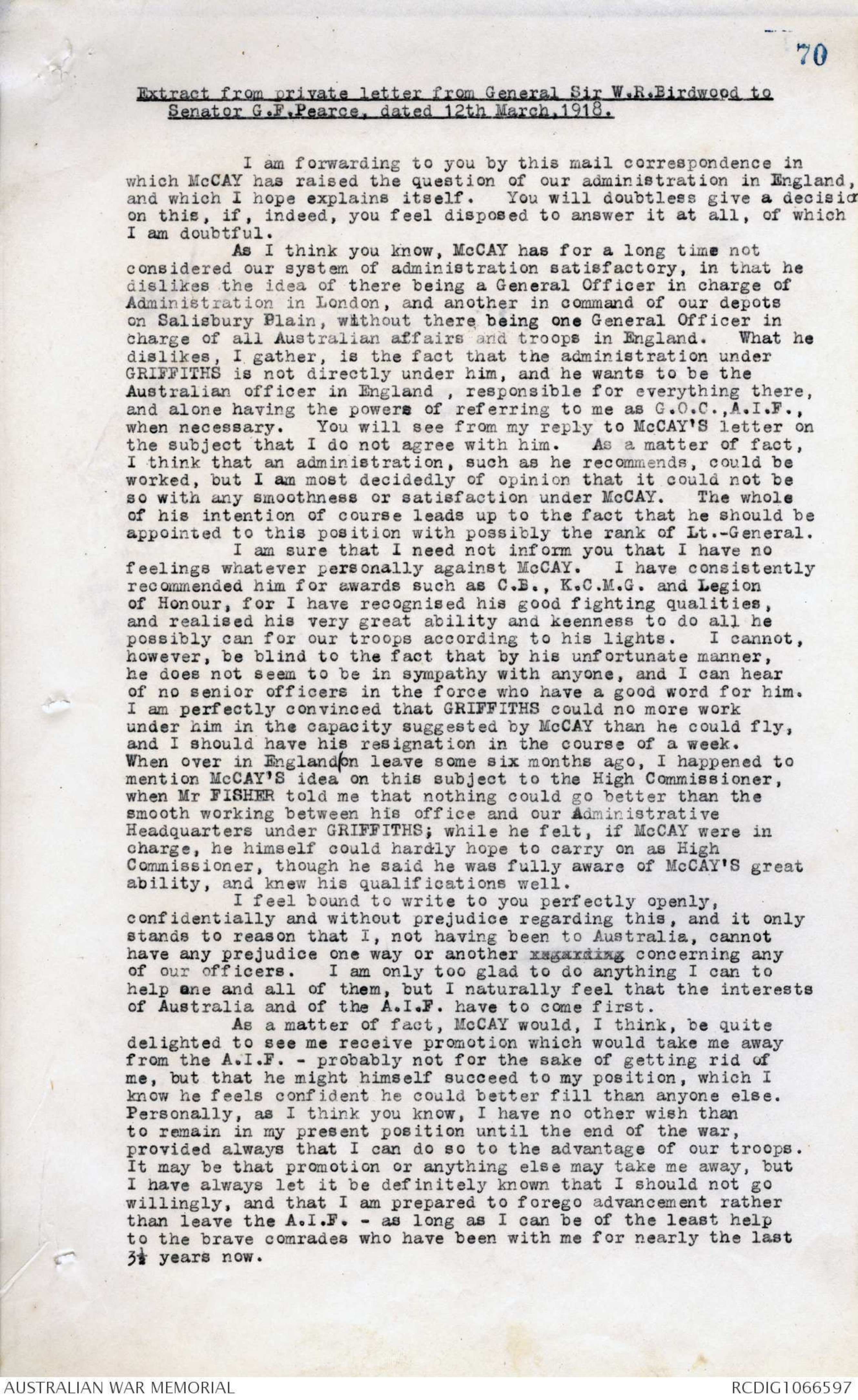
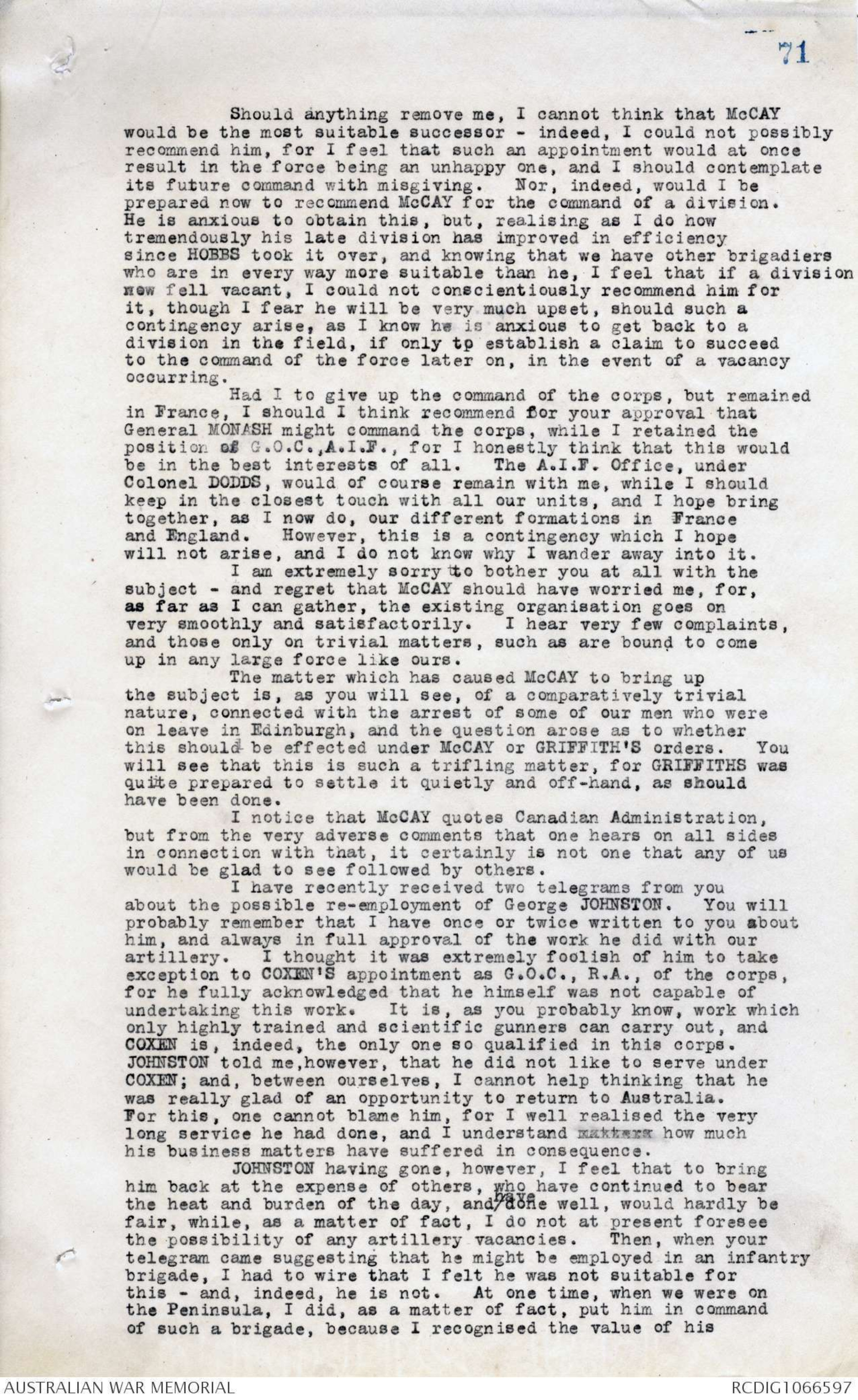
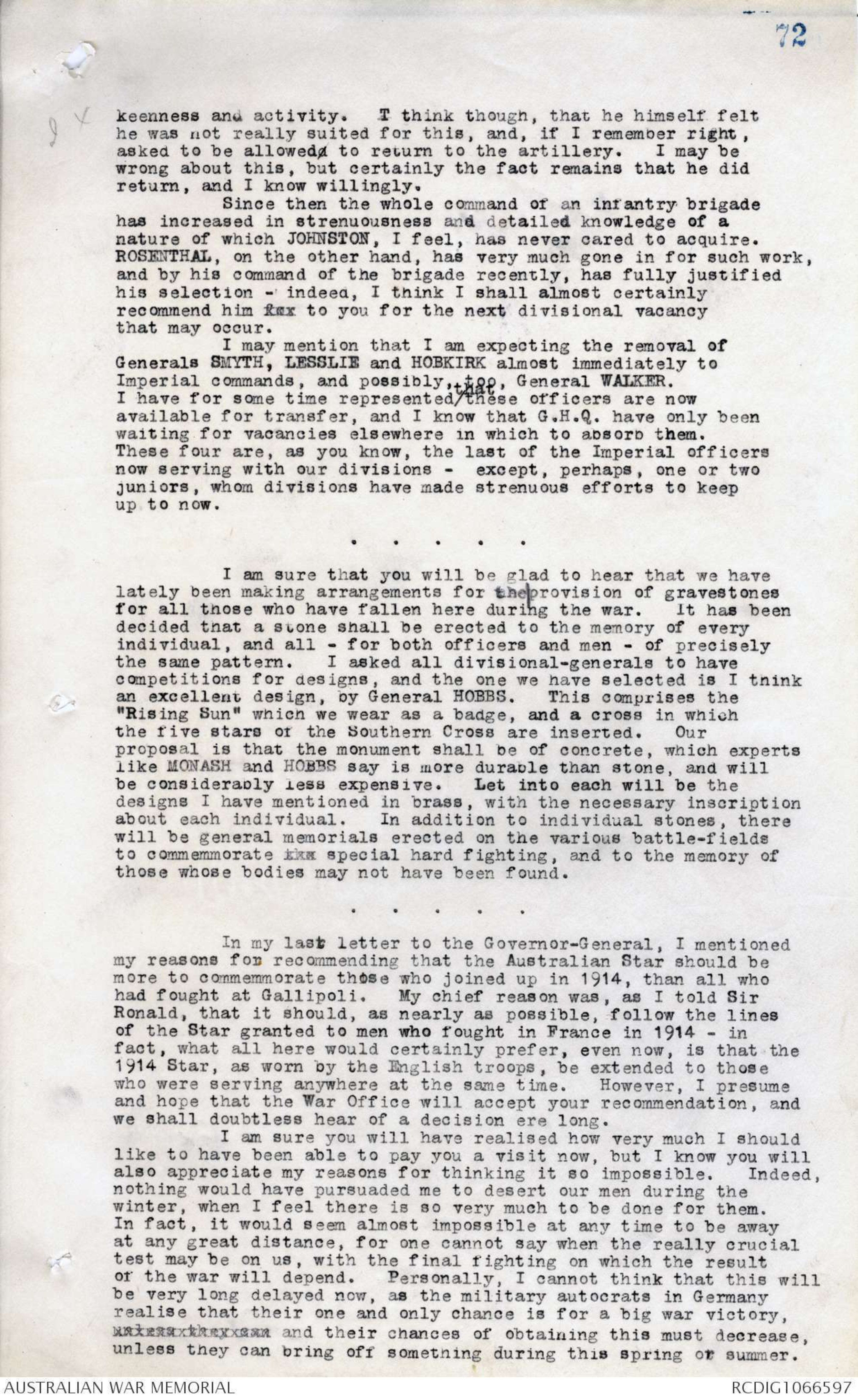
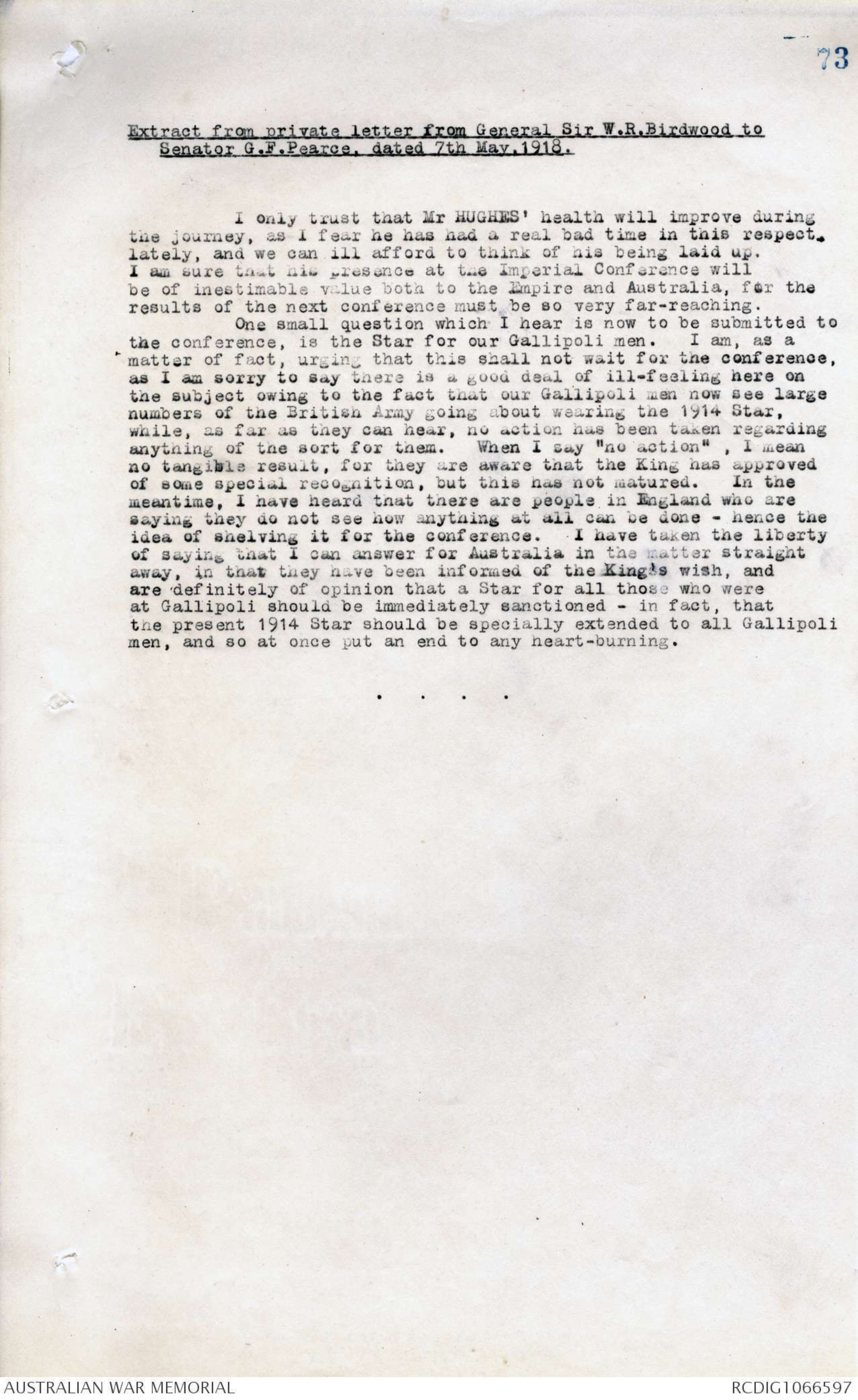
64
Decipher of Cablegram received from General Sir W.R.BIRDWOOD
Australian Corps, London. by DEFENCE Melbourne - despatched
on April 17th, 1918; received 18th April, 1918.
DEFENCE
MELBOURNE.
"T.2720 17th PLEASE TAKE NO ACTION REGARDING MY LETTER
JANUARY 28th WITH REFERENCE TO EGYPT TILL YOU HEAR FROM ME
AGAIN AM NOW WRITING."
BIRDWOOD
AUSTRALIAN CORPS.
65
COPY.
AUSTRALIAN IMPERIAL FORCE.
Headquarters,
Australian Corps,
28th January, 1918.
Confidential.
For your personal consideration.
Memorandum:
If, as I assume is probable, troops will be retained in
Egypt for a considerable time, I think it is well worthy of
consideration as to whether it would not be sound to transfer
the whole of the Australian troops now in France to that country, and
to replace them in France by a like number of English troops now in
Egypt and Palestine. I am not aware of the exact numbers of
troops in the Egyptian command, but I believe that they exceed
in number the Australian troops in France.
My main reasons for making this proposal are :-
(1) Faced, as we are, with enormous transport difficulties,
we should at once alleviate these considerably by obviating the
crossing of all English reinforcements from England to Egypt,
and of Australian reinforcements from Egypt to England, if this
transfer were effected. The amount of transport to be kept up
in the Mediterranean would be reduced to a minimum - sufficient
only to keep the forces there supplied with material of all sorts,
while practically no actual troops would be crossing.
(2) In view of demobilisation after the war, a very big step
towards this would be effected during hostilities, English troops
being brought to France, while Australian troops in Egypt would be
well on their way home. Realising, as we do, the very long time it
must take to get these troops back to Australia, this point is one
deserving of serious consideration.
I would not for a moment suggest that this question
should be taken up immediately, with the possibility probability of a big
German offensive on the Western front in the course, perhaps,
of the next few months, but I think it might well be considered
now with a view of being given effect to in the autumn, should
it be deemed advisable and proper.
Further points which are I think worthy of consideration
in this connection are:-
(a) The Australian troops have been accustomed to a warm and dry
climate, and have undoubtedly felt very considerably the last two
winters in France, with the result that, I believe, the Australian
medical authorities are of the opinion that they have lost considerably
in the way of powers of endurance against climate, with the resultant
weakening of their recuperative forces, and that they would undoubtedly
be much better suited for the conditions and the climate of
Egypt and Palestine.
(b) Such improved conditions would mean a decided diminution in the
number of men who now have to be returned to Australia as "unfit."
In view of the recent failure of the referendum in that country, this
is undoubtedly an important point, as there seems little probability
of the necessary reinforcements coming forward to keep units up to
strength with present wastage, and a smaller number of reinforcements
would be required for a force in Egypt.
(c) In addition to men, Australia sends a considerable quantity of
supplies for her troops. These now have naturally to be brought to
England. There would be a very large saving of transport and time
as well as very much reduced submarine risk, if these were consigned
only to Egypt.
66
(d) Australia, like England, is daily building up a very heavy
burden of debt. Every day saved in releasing a large number of
men from her forces on demobilisation, and re-establishing them
in civil employment in Australia, is of national importance.
Further, by co-ordinating the Australian forces now in England,
France and Egypt, large savings of personnel and in administrative
cost would be effected.
(e) The congestion at ports and wharves both in England
and in France is bound to be very great at the close of the war.
It is therefore advisable to give effect, as early as possible,
to such proposals as can clearly be accepted without interfering
with military efficiency, with a view to alleviating this
congestion.
From the sentimental view, which often counts for much,
I think it is probable that the people of Australia would
appreciate their troops being nearer to and in closer touch
with them, as they would be in Egypt.
In the above, I have referred only to the Australian
troops, but what I have said would seem to apply with equal
force to the New Zealand Division in France.
(sgd) W.R.BIRDWOOD.
67
Extract from private letter from General Birdwood to Senator
Pearce, dated 1st February, 1918.
I am now trying to make arrangements to send home on
every returning ship some fifty of our most deserving cases of
originally enlisted men. I am not calling this leave, or
making any general pronouncement on the subject, for I know
well, if I did so, that we would be liable to be overwhelmed
with applications and possibly grievances. Also, I know that,
if it was in any way given out that leave was being opened,
we should have a "howl" from the War Office, as I fear it would
involve them with all sorts of difficulties by demands
being made for the grant of leave to Canadians, New Zealanders,
troops from India, etc. I therefore propose to employ
something like 50 men per ship on submarine guard duty, etc.,
and to ask you to arrange for them to be given two months
clear in Australia before being sent back to us. If, later on,
I find it possible to increase this number, I shall do so, but
as a start, I hope you will agree that this is on satisfactory
lines. I hope you will of course not publish anything
in Australia regarding the possibility of such leave being opened,
otherwise I am sure that neither your life nor mine would be
worth living, while it would naturally misrepresented misinterpreted
by some people in Australia.
In connection with the breaking up of one battalion
per brigade, regarding which I wrote to you in my last letter,
I have now decided to see if I can manage to convert the
battalion to be so disbanded xxxx into a depot battalion
in England. The officers and men would of course be
utilised in keeping up to strength the remaining three
battalions of the brigade, but the battalion staff and the
name of the battalion would be transferred to the depot,
and so would be preserved as a living entity with all
its battalion traditions, to return I hope as such
to Australia at the end of the war. This seems to be the
best way of dealing with the whole question.
68
Extract from private letter from General Sir W.R.Birdwood to
Senator G.F.Pearce, dated 15th April,1918.
Curiously enough, when commanding the 4th Army in the
Northern sector about a month before this attack started, I told
the Commander-in-Chief that my apprehension then was that the
German might make a big attack on Hazebruck with the idea of
cutting off the Northern xxxxxx (i.e., the 4th) Army from the
rest of the force, and driving us back on to the Channel ports.
I think he quite agreed that this was a possibility to be
considered, but in view of the very big concentration in the
vicinity of Cambrai - St.Quentin, it did not look as if this
could be contemplated at present. I sincerely trust that the
thrust is not of sufficient strength to reach as far as
Hazebruck, which is an important junction.
I forget if I mentioned to you that when this big attack
began, I was on leave in England. Being a Sunday, and no trains
available, I returned by aeroplane, actually reaching my headquarters
within an hour and a half of leaving England - a very
convenient mode of travel, but not a very pleasant one, on such
a very stormy and gusty day as I had, for in addition to being
bumped up and down, we had constantly to keep diving to avoid
cloud banks. However, the saving of time was well worth it,
and I was, as I always am, delighted to be back again with my men.
I have just sent you a telegram in connection with the
suggestion which I made to you on the 28th January about taking
up the question of the transfer of the Australian troops to
Egypt in the autumn. I have only just heard that nearly
all the English infantry divisions in Egypt are being transferred
to France, leaving only a comparatively ^very small force of white
infantry in that country, the remainder of the force consisting
of mounted troops, infantry from India, etc. This being the
case, there could of course be no question of our divisions
exchanging with English divisions now there, which puts quite a
new aspect on the whole question, and which I think will probably
decide you not to make any representations on the subject,
though doubtless Mr HUGHES, while in England, may care personally
to discuss it.
69
Extract from letter dated 16th April 1918, from the Commander-in-Chief
to General Sir W.R.Birdwood, and enclosed ^as a P.S. in a private
letter dated 15th April,1918, to Senator Pearce.
The right of our line in close connection with the
French is so vital to me, that I must keep reliable troops/there,
and I cannot tell you with what confidence I contemplate the
situation in that part of my front,as long as the Australian
Corps are holding it.
Your 1st Division in front of Hazebruck has done
splendidly and defeated all hostile attacks.
Thanking you for all you and your gallant troops
are doing for me.
70
Extract from private letter from General Sir W.R.Birdwood to
Senator G.F.Pearce, dated 12th March, 1918.
I am forwarding to you by this mail correspondence in
which McCAY has raised the question of our administration in England,
and which I hope explains itself. You will doubtless give a decision
on this, if, indeed, you feel disposed to answer it at all, of which
I am doubtful.
As I think you know, McCAY has for a long time not
considered our system of administration satisfactory, in that he
dislikes the idea of there being a General Officer in charge of
Administration in London, and another in command of our depots
on Salisbury Plain, without there being one General Officer in
charge of all Australian affairs and troops in England. What he
dislikes, I gather, is the fact that the administration under
GRIFFITHS is not directly under him, and he wants to be the
Australian officer in England, responsible for everything there,
and alone having the powers of referring to me as G.O.C.,A.I.F.,
when necessary. You will see from my reply to McCAY'S letter on
the subject that I do not agree with him. As a matter of fact,
I think that an administration, such as he recommends, could be
worked, but I am most decidedly of opinion that it could not be
so with any smoothness or satisfaction under McCAY. The whole
of his intention of course leads up to the fact that he should be
appointed to this position with possibly the rank of Lt.-General.
I am sure that I need not inform you that I have no
feelings whatever personally against McCAY. I have consistently
recommended him for awards such as C.B., K.C.M.G. and Legion
of Honour, for I have recognised his good fighting qualities,
and realised his very great ability and keenness to do all he
possibly can for our troops according to his lights. I cannot,
however, be blind to the fact that by his unfortunate manner,
he does not seem to be in sympathy with anyone, and I can hear
of no senior officers in the force who have a good word for him.
I am perfectly convinced that GRIFFITHS could no more work
under him in the capacity suggested by McCAY than he could fly,
and I should have his resignation in the course of a week.
When over in England/on leave some six months ago, I happened to
mention McCAY'S idea on this subject to the High Commissioner,
when Mr FISHER told me that nothing could go better than the
smooth working between his office and our Administrative
Headquarters under GRIFFITHS; while he felt, if McCAY were in
charge, he himself could hardly hope to carry on as High
Commissioner, though he said he was fully aware of McCAY'S great
ability, and knew his qualifications well.
I feel bound to write to you perfectly openly,
confidentially and without prejudice regarding this, and it only
stands to reason that I, not having been to Australia, cannot
have any prejudice one way or another regarding concerning any
of our officers. I am only too glad to do anything I can to
help one and all of them, but I naturally feel that the interests
of Australia and of the A.I.F. have to come first.
As a matter of fact, McCAY would, I think, be quite
delighted to see me receive promotion which would take me away
from the A.I.F. - probably not for the sake of getting rid of
me, but that he might himself succeed to my position, which I
know he feels confident he could better fill than anyone else.
Personally, as I think you know, I have no other wish than
to remain in my present position until the end of the war,
provided always that I can do so to the advantage of our troops.
It may be that promotion or anything else may take me away, but
I have always let it be definitely known that I should not go
willingly, and that I am prepared to forego advancement rather
than leave the A.I.F. - as long as I can be of the least help
to the brave comrades who have been with me for nearly the last
3½ years now.
71
Should anything remove me, I cannot think that McCAY
would be the most suitable successor - indeed, I could not possibly
recommend him, for I feel that such an appointment would at once
result in the force being an unhappy one, and I should contemplate
its future command with misgiving. Nor, indeed, would I be
prepared now to recommend McCAY for the command of a division.
He is anxious to obtain this, but, realising as I do how
tremendously his late division has improved in efficiency
since HOBBS took it over, and knowing that we have other brigadiers
who are in every way more suitable than he, I feel that if a division
now fell vacant, I could not conscientiously recommend him for
it, though I fear he will be very much upset, should such a
contingency arise, as I know he is anxious to get back to a
division in the field, if only to establish a claim to succeed
to the command of the force later on, in the event of a vacancy
occurring.
Had I to give up the command of the corps, but remained
in France, I should I think recommend for your approval that
General MONASH might command the corps, while I retained the
position of G.O.C.,A.I.F., for I honestly think that this would
be in the best interests of all. The A.I.F. Office, under
Colonel DODDS, would of course remain with me, while I should
keep in the closest touch with all our units, and I hope bring
together, as I now do, our different formations in France
and England. However, this is a contingency which I hope
will not arise, and I do not know why I wander away into it.
I am extremely sorry to bother you at all with the
subject - and regret that McCAY should have worried me, for,
as far as I can gather, the existing organisation goes on
very smoothly and satisfactorily. I hear very few complaints,
and those only on trivial matters, such as are bound to come
up in any large force like ours.
The matter which has caused McCAY to bring up
the subject is, as you will see, of a comparatively trivial
nature, connected with the arrest of some of our men who were
on leave in Edinburgh, and the question arose as to whether
this should be effected under McCAY or GRIFFITH'S orders. You
will see that this is such a trifling matter, for GRIFFITHS was
quite prepared to settle it quietly and off-hand, as should
have been done.
I notice that McCAY quotes Canadian Administration,
but from the very adverse comments that one hears on all sides
in connection with that, it certainly is not one that any of us
would be glad to see followed by others.
I have recently received two telegrams from you
about the possible re-employment of George JOHNSTON. You will
probably remember that I have once or twice written to you about
him, and always in full approval of the work he did with our
artillery. I thought it was extremely foolish of him to take
exception to COXEN'S appointment as G.O.C., R.A., of the corps,
for he fully acknowledged that he himself was not capable of
undertaking this work. It is, as you probably know, work which
only highly trained and scientific gunners can carry out, and
COXEN is, indeed, the only one so qualified in this corps.
JOHNSTON told me, however, that he did not like to serve under
COXEN; and, between ourselves, I cannot help thinking that he
was really glad of an opportunity to return to Australia.
For this, one cannot blame him, for I well realised the very
long service he had done, and I understand matters how much
his business matters have suffered in consequence.
JOHNSTON having gone, however, I feel that to bring
him back at the expense of others, who have continued to bear
the heat and burden of the day, and ^have done well, would hardly be
fair, while, as a matter of fact, I do not at present foresee
the possibility of any artillery vacancies. Then, when your
telegram came suggesting that he might be employed in an infantry
brigade, I had to wire that I felt he was not suitable for
this - and, indeed, he is not. At one time, when we were on
the Peninsula, I did, as a matter of fact, put him in command
of such a brigade, because I recognised the value of his
72
[*I X*] keenness and activity. T think though, that he himself felt
he was not really suited for this, and, if I remember right,
asked to be allowedd to return to the artillery. I may be
wrong about this, but certainly the fact remains that he did
return, and I know willingly.
Since then the whole command of an infantry brigade
has increased in strenuousness and detailed knowledge of a
nature of which JOHNSTON, I feel, has never cared to acquire.
ROSENTHAL, on the other hand, has very much gone in for such work,
and by his command of the brigade recently, has fully justified
his selection - indeed, I think I shall almost certainly
recommend him for to you for the next divisional vacancy
that may occur.
I may mention that I am expecting the removal of
Generals SMYTH, LESSLIE and HOBKIRK almost immediately to
Imperial commands, and possibly, too. General WALKER.
I have for some time represented ^that these officers are now
available for transfer, and I know that G.H.Q. have only been
waiting for vacancies elsewhere in which to absorb them.
These four are, as you know, the last of the Imperial officers
now serving with our divisions - except, perhaps, one or two
juniors, whom divisions have made strenuous efforts to keep
up to now.
I am sure that you will be glad to hear that we have
lately been making arrangements for the/provision of gravestones
for all those who have fallen here during the war. It has been
decided that a stone shall be erected to the memory of every
individual, and all - for both officers and men - of precisely
the same pattern. I asked all divisional-generals to have
competitions for designs, and the one we have selected is I think
an excellent design, by General HOBBS. This comprises the
"Rising Sun" which we wear as a badge, and a cross in which
the five stars of the Southern Cross are inserted. Our
proposal is that the monument shall be of concrete, which experts
like MONASH and HOBBS say is more durable than stone, and will
be considerably less expensive. Let into each will be the
designs I have mentioned in brass, with the necessary inscription
about each individual. In addition to individual stones, there
will be general memorials erected on the various battle-fields
to commemmorate the special hard fighting, and to the memory of
those whose bodies may not have been found.
In my last letter to the Governor-General, I mentioned
my reasons for recommending that the Australian Star should be
more to commemmorate those who joined up in 1914, than all who
had fought at Gallipoli. My chief reason was, as I told Sir
Ronald, that it should, as nearly as possible, follow the lines
of the Star granted to men who fought in France in 1914 - in
fact, what all here would certainly prefer, even now, is that the
1914 Star, as worn by the English troops, be extended to those
who were serving anywhere at the same time. However, I presume
and hope that the War Office will accept your recommendation, and
we shall doubtless hear of a decision ere long.
I am sure you will have realised how very much I should
like to have been able to pay you a visit now, but I know you will
also appreciate my reasons for thinking it so impossible. Indeed,
nothing would have pursuaded me to desert our men during the
winter, when I feel there is so very much to be done for them.
In fact, it would seem almost impossible at any time to be away
at any great distance, for one cannot say when the really crucial
test may be on us, with the final fighting on which the result
of the war will depend. Personally, I cannot think that this will
be very long delayed now, as the military autocrats in Germany
realise that their one and only chance is for a big war victory,unless they can and their chances of obtaining this must decrease,
unless they can bring off something during this spring or summer.
73
Extract from private letter from General Sir W.R.Birdwood to
Senator G.F.Pearce, dated 7th May, 1918.
I only trust that Mr HUGHES' health will improve during
the journey, as I fear he has had a real bad time in this respect.
lately, and we can ill afford to think of his being laid up.
I am sure that his presence at the Imperial Conference will
be of inestimable value both to the Empire and Australia, for the
results of the next conference must be so very far-reaching.
One small question which I hear is now to be submitted to
the conference, is the Star for our Gallipoli men. I am, as a
matter of fact, urging that this shall not wait for the conference,
as I am sorry to say there is a good deal of ill-feeling here on
the subject owing to the fact that our Gallipoli men now see large
numbers of the British Army going about wearing the 1914 Star,
while, as far as they can hear, no action has been taken regarding
anything of the sort for them. When I say "no action", I mean
no tangible result, for they are aware that the King has approved
of some special recognition, but this has not matured. In the
meantime, I have heard that there are people in England who are
saying they do not see how anything at all can be done - hence the
idea of shelving it for the conference. I have taken the liberty
of saying that I can answer for Australia in the matter straight
away, in that they have been informed of the King's wish, and
are definitely of opinion that a Star for all those who were
at Gallipoli should be immediately sanctioned - in fact, that
the present 1914 Star should be specially extended to all Gallipoli
men, and so at once put an end to any heart-burning.
 Not Yet Replaced By AI
Not Yet Replaced By AIThis transcription item is now locked to you for editing. To release the lock either Save your changes or Cancel.
This lock will be automatically released after 60 minutes of inactivity.